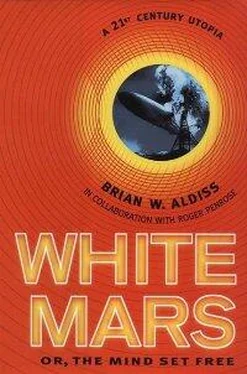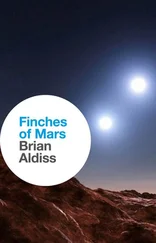Brian Aldiss - White Mars
Здесь есть возможность читать онлайн «Brian Aldiss - White Mars» весь текст электронной книги совершенно бесплатно (целиком полную версию без сокращений). В некоторых случаях можно слушать аудио, скачать через торрент в формате fb2 и присутствует краткое содержание. Год выпуска: 1999, ISBN: 1999, Издательство: Little, Brown UK, Жанр: Фантастика и фэнтези, на английском языке. Описание произведения, (предисловие) а так же отзывы посетителей доступны на портале библиотеки ЛибКат.
- Название:White Mars
- Автор:
- Издательство:Little, Brown UK
- Жанр:
- Год:1999
- ISBN:0-316-85243-0
- Рейтинг книги:5 / 5. Голосов: 1
-
Избранное:Добавить в избранное
- Отзывы:
-
Ваша оценка:
- 100
- 1
- 2
- 3
- 4
- 5
White Mars: краткое содержание, описание и аннотация
Предлагаем к чтению аннотацию, описание, краткое содержание или предисловие (зависит от того, что написал сам автор книги «White Mars»). Если вы не нашли необходимую информацию о книге — напишите в комментариях, мы постараемся отыскать её.
White Mars — читать онлайн бесплатно полную книгу (весь текст) целиком
Ниже представлен текст книги, разбитый по страницам. Система сохранения места последней прочитанной страницы, позволяет с удобством читать онлайн бесплатно книгу «White Mars», без необходимости каждый раз заново искать на чём Вы остановились. Поставьте закладку, и сможете в любой момент перейти на страницу, на которой закончили чтение.
Интервал:
Закладка:
Yet in his mouth that last word held a dying fall.
That night, when alone, I wept. I could not stop.
I wept mostly for myself, but also for humanity, so possessed by their reproductive organs. Our Martian population was slave to unwritten ancient law, multiplying as it saw fit. That pleasure of which my Tom spoke always came with responsibilities.
At least the R A hospital could prepare for an outburst of maternity, its original duties being in abeyance. There were no new intakes of visitors to be acclimatised. One ward was converted into a new maternity unit, all brightly lit and antiseptic, in which births could be conducted with conveyor-belt efficiency.
Everywhere, there was industry. Existing buildings were converted to new uses. The synthesising kitchens were extended. Factories were established for the synthesis of cloth for clothing. All talents were seized upon for diverse works. During the day the noise of hammering and drilling was to be heard. We would endeavour to be comfortable, however temporary our stay.
There was music in the domes. Not all terrestrial music was to our taste, and composers like Beza were sought to compose Martian music—whatever that might be!
The more far-sighted of us looked ahead to a more distant future. Among these was Tom. Whether or not he really had hope, he and his committee pressed ahead with his plans to involve everyone in everyone else’s welfare. They engrossed him; sometimes I felt he had no personal life.
He declared that it was a matter of expedience that the education of young children should be given priority. There I was able to assist him to some extent.
Several committees were elected to formulate with others their hopes and endeavours for a better society. They held colloquia, which began in itinerant fashion, the more appealing ones becoming permanent features of our life. Sometimes they were met with impatience or hostility, although it was generally conceded that conditions in the domes might get rapidly worse unless they were rapidly improved. Improvement was something we strove for.
Emerson’s remark long ago that people preened themselves on improvements in society, yet no one individual improved, lay at the basis of many endeavours. The mutuality required for a just society implied that we must hope to improve the individual, to fortify him; otherwise any improvements would merely enhance the status of the powerful and lower that of the less powerful, and we would be back with the suppressions so prevalent on Earth.
Somewhere in the individual life must lie the salvation of whole societies, or else all was lost.
Hard as I tried, I found it difficult to study. If only I could learn more, I told myself, Tom would love me more. Many a time, I would simply sit in a cafe and listen to the music that filled the place. Kathi Skadmorr and I had many conversations. For her, learning seemed easy. She worked with Dreiser Hawkwood and found him, she said, a little overpowering. I thought privately that anyone Kathi found overpowering was worth a great deal of respect.
She had become absorbed in studying Olympus Mons. At times, the great volcanic cone seemed to fill her thought. She had submitted a carefully reasoned paper to Dreiser on the Ambient, suggesting a name change. Olympus was a “fuddy-duddy” name. She had found a better name for it when talking with an Ecuadorian scientist, Georges Souto. He had told her of an extinct volcano in Ecuador, the top of which, he said, because of the oblate spheroidal nature of Earth, was the point furthest from the centre of the Earth. In fact, it was 2,150 metres further from that centre than Everest, commonly assumed to be the highest point on Earth.
The sophistry of this argument greatly amused Kathi. When she learned that this defunct volcano was named Chimborazo, meaning the “Watchtower of the Universe’, she campaigned for Olympus Mons to be renamed Chimborazo. The campaign was a failure at first, and Dreiser, she said, was annoyed with her for talking nonsense.
Shortly after this, she studied satellite photographs of the Tharsis Shield, and observed—so she claimed—tumbled and churned regolith on the far side of Olympus, as if something had been burrowing there. When she pointed this out to Dreiser, he told her not to waste his time, or she would be sent back to the domes.
Many of the pressures extant on Earth—or Downstairs, as had become the fashionable term for our mother planet—had been relieved by our exile Upstairs. The intense pressure of commercialism had been lifted. So had many of the provocations of racism; here, we were all in the same boat, rather than in many jostling boats.
In particular, money, the gangrene of the political system, had been removed from play, although admittedly a sort of credit scheme existed, whereby payments were postponed until we were hypothetically returned Downstairs.
After a year or so, this credit scheme had taken sick and died, primarily because we found we could manage without it, and secondarily because we ceased to believe in it.
It was deemed futile to approach any individual with ambitious schemes if he or she was miserable. Many people missed or worried about their families Downstairs. Once our communication cards ran out, there was no renewing them, and the terrestrial telecom station was closed down—another feature of the EUPACUS fiasco. Counselling was provided, and the psychurgical group was kept busy. Also effective in healing was the community spirit that had arisen, and a renewed sense of adventure. We lived in a new place, within a new context, the “different psychological calculus”.
One of our colloquia became engaged in the art of making new music: primarily a capella singing, which we raised to high standards. We had brought in home-made and revolutionary musical instruments. The “Martian Meritorio” was established in time as our great success. But I still remember with affection our solo voices raised in song—in specially written song.
No bird flies in the abyss
Its bright plumage failing
No eye lights in the dark
Its sight unavailing
The air carries no spark
Only this —
Only this
Where sunlight lies ailing —
Our human hopes sailing
In humankind’s ark
The improvement of the individual was pursued in such sessions as body-mind-posture, conducted at first by Ben Borrow, a disciple of the energetic Belle Rivers. Borrow was a little undersized man, full of energy, as easily roused to anger as to raucous laughter. He drove and inspired his attendees to believe, as he did, that the secret of a good life lurked in how one stood, sat and walked in the light gravity.
Perhaps because the bleak surroundings led our thoughts that way, our Art of Imagination colloquium was always successful. Swift and Laputa, those two satellites, first dreamed of by an Irish dean, that chased regularly above our heads, were used to connect the reality of our lives with the greater reality of which we were a transitory part.
A way of knowing ourselves was to relate our lived experience with the flow of language, thought and concepts surrounding us, by which the mundane could be reimagined. “Know thyself was an exortation requiring, above all, imagination. In this department, the Willa-Vera Composite, one so whippetlike, the other so much like a doughnut, proved invaluable.
Hard work along these lines produced some extraordinary artistries, not least the four-panel continuous loop video abstract entitled “Dawning Diagram” which, with its mystery and majesty, affected all who watched it. Human things writhed into shape from the molecular, rose, ran, flowered in bursts of what could have been sun, could have been rain, might have been basalt, died, bathed in reproductive dawns. In another quarter of the screen an old Tiresias read in a vellum-bound volume, tirelessly turning the same page.
Читать дальшеИнтервал:
Закладка:
Похожие книги на «White Mars»
Представляем Вашему вниманию похожие книги на «White Mars» списком для выбора. Мы отобрали схожую по названию и смыслу литературу в надежде предоставить читателям больше вариантов отыскать новые, интересные, ещё непрочитанные произведения.
Обсуждение, отзывы о книге «White Mars» и просто собственные мнения читателей. Оставьте ваши комментарии, напишите, что Вы думаете о произведении, его смысле или главных героях. Укажите что конкретно понравилось, а что нет, и почему Вы так считаете.










